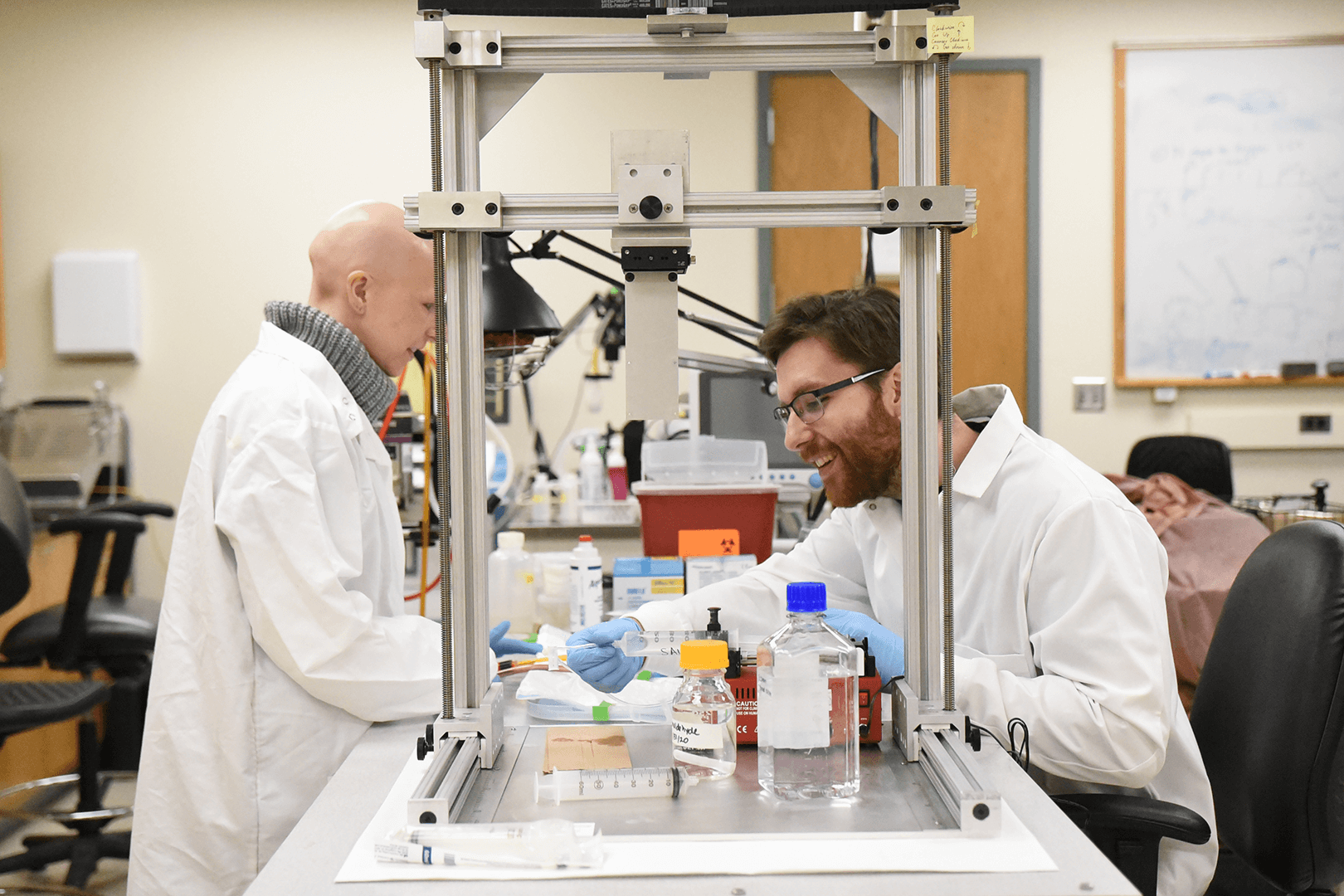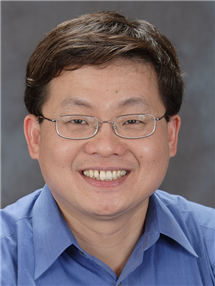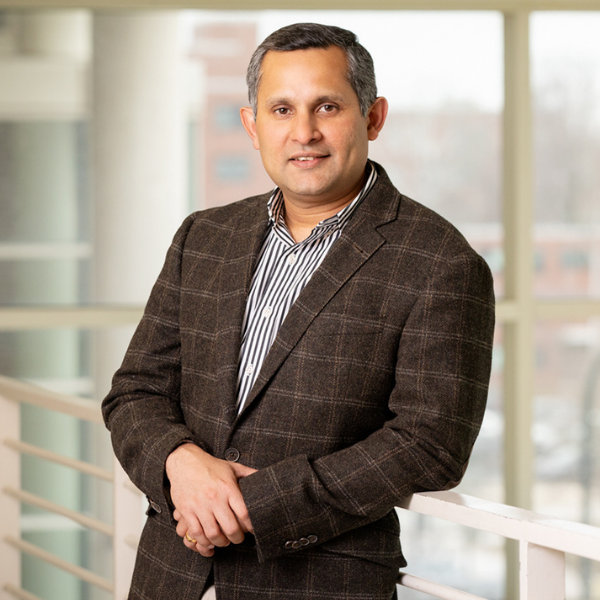
The Cancer Center at Illinois supports the most innovative and exciting ideas from faculty at the University of Illinois. CCIL grant programs spark and support transdisciplinary collaborations that develop projects from early ideas to a competitive external funding proposal.
These grant funding opportunities are designed to foster new collaborations that reach across the engineering and biology continuum and leverage research team results for submitting external multi-PI grants in the cancer area.
Each application is reviewed and discussed by a panel of reviewers, following a process similar to that used by NIH.
Seed Grant Program
The CCIL Seed Grant program solicits interdisciplinary team research proposals to initiate new collaborations and enhance existing collaborations among CCIL members and Illinois faculty.
TEP Utilization Grant
The CCIL TEP Utilization Grant supports Illinois researchers in advancing cancer research by providing up to $5,000 of support for the use of the Tumor Engineering and Phenotyping (TEP) Shared Resource.
Bridge Grant Program
The CCIL Bridge Grant Program provides assistance to cancer-focused research grant proposals that are at the R01 or multi-project level mechanisms.
High-throughput Screening Support Grants
The CCIL partners with the High-throughput Screening Facility (HTSF) within the School of Chemical Sciences to provide funding support to researchers interested in using the facility to advance cancer research.
JumpStart Program
The CCIL JumpStart program is for established investigators (at the level of Associate Professor or above), who are not yet CCIL members, to engage in collaborative research with existing members to accelerate progress against cancer.
Where Cancer Research Meets Collaboration
Diwakar Shukla
“Cancer research needs multidisciplinary approaches and the Cancer Center at Illinois has developed a unique research program focused on the interface between data science, measurement technology, and cancer research.”

Kevin Chang
“Cancer is among the largest health concerns today and supporting cancer research helps scientists advance the prevention and treatment of it.”

Prasanth Kumar V. Kannanganattu
“The CCIL helps to bridge biologists, engineers and medical professionals in the campus to explore new avenues towards understanding the biology of cancer, ultimately paving the way to novel therapeutic strategies.”

Planning Grant Funding
2019 - 2022 Planning Grant Projects
2020 Recipients
Identifying Pathways for Therapeutic Design to Stop Liver Cancer
Principal Investigator:
- Sayeepriyadarshini Anakk, Associate Professor, Molecular and Integrative Physiology
Research Team:
- Auinash Kalsotra, Associate Professor, Biochemistry
- Stephen Boppart, Professor, Electrical and Computer Engineering
Enhancing GBM Immunotherapy Through Peripheral Viral Infection and Inhibition of Immune Suppression in the Tumor Microenvironment
Principal Investigator:
- H. Rex Gaskins, Professor, Animal Sciences
Research Team:
- Andrew Steelman, Assistant Professor, Animal Sciences
- Ed Roy, Professor Emeritus, Pathology and Molecular and Integrative Physiology
- Stephen Boppart, Professor, Electrical and Computer Engineering
- Brendan Harley, Professor, Chemical and Biomolecular Engineering
Effect of Dietary Modulation of RAGE/AGE Axis on Prostatic Neuroendocrine Differentiation and the Efficacy of Anticancer Therapies
Principal Investigator:
- Wawrzyniec Dobrucki, Associate Professor, Bioengineering
Research Team:
- Erik Nelson, Assistant Professor, Molecular and Integrative Physiology
- Gregory Underhill, Associate Professor, Bioengineering
2019 Recipients
A 3-D In Vitro Biomimetic Tumor Microenvironment Integrated with a Micro Sensor Platform
Principal Investigator:
- M. Taher A. Saif, Professor, Mechanical Science and Engineering
Research Team:
- Kimberly Selting, Associate Professor, Veterinary Medicine
- Mohammed El-Kebir, Assistant Professor, Computer Science
Diet-modified Efficacy of RAGE-targeted Prostate Cancer Treatments
Principal Investigator:
- Wawrzyniec Dobrucki, Associate Professor, Bioengineering
Research Team:
- Erik Nelson, Assistant Professor, Molecular and Integrative Physiology
- John W. Erdman, Professor Emeritus, Food Science and Human Nutrition
Elucidating Mechanisms by which Environmental Toxicants Induce Liver Cancer
Principal Investigator:
- Auinash Kalsotra, Associate Professor, Biochemistry
Research Team:
- Joseph Irudayaraj, Professor, Bioengineering
- Jodi Flaws, Professor, Comparative Biosciences
Elucidating Premetastatic Niche-Induced Therapy Resistance Mechanisms in ER(+) Metastatic Breast Cancers
Principal Investigator:
- Zeynep Madak-Erdogan, Assistant Professor, Food Science and Human Nutrition
Research Team:
- Roy Dar, Assistant Professor, Bioengineering
- Erik Nelson, Assistant Professor, Molecular and Integrative Physiology
Eradication of H.Pylori with PH-sensitive Antimicrobial Polypeptides to Reduce Gastric Cancer
Principal Investigator:
- Jianjun Cheng, Professor, Bioengineering
Research Team:
- Lin-Feng Chen, Professor, Biochemistry
Integrated Computational and CRISPR-CAS9 Imaging Platforms for Studying Non-Coding Pathogenic Germline Variants and Somatic Mutations in Breast Cancer
Principal Investigator:
- Pablo Perez-Pinera, Assistant Professor, Bioengineering
Research Team:
- Jun Song, Professor of Physics
- Thomas Kuhlman, Assistant Professor, Physics
Listening Online and Listening Face-to-Face: Innovative Mixed-Method Approaches for Studying Cancer Communication in the New Media Environment
Principal Investigator:
- Kevin Chang, Professor, Computer Science
Research Team:
- Cabral Bigman-Galimore, Assistant Professor, Communication
- Diana Grigsby-Toussaint, Associate Professor, Kinesiology and Community Health
Predicting Response to Cancer Immunotherapy Using a Subclone-Integrated Machine Learning Model of Neoantigen Processing, Presentation, and Recognition
Principal Investigator:
- Jian Peng, Assistant Professor, Computer Science
Research Team:
- Mohammed El-Kebir, Assistant Professor of Computer Science
- Hong Jin, Assistant Professor, Biochemistry
